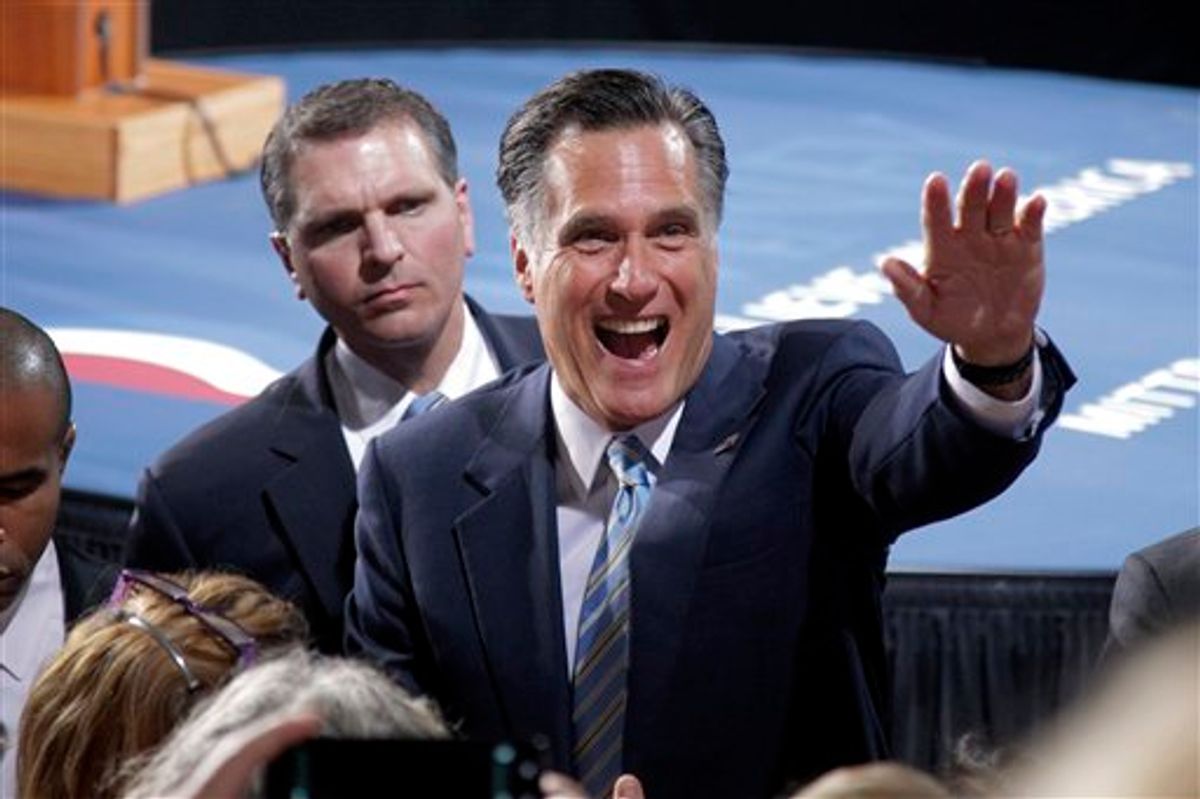One of Mitt Romney’s top advisors claimed over the weekend that “the only economic success that President Obama has had is because he followed Mitt Romney’s advice.” Eric Fehrnstrom was referring to the revival of the American auto industry, which was made possible by the structured bankruptcies that General Motors and Chrysler went through early in Obama’s term – structured bankruptcies that Romney advocated months before Obama took office.
That’s the Romney version of the story, anyway. As you might expect, it’s not exactly consistent with what the candidate and his campaign have said before. Romney’s public posture toward the bailout of Detroit has varied over the past few years, always in accordance with his political imperatives of the moment.
Back in November 2008, when President Bush gave bridge loans designed to keep each company afloat for at least a few more months, Romney penned a famous Op-Ed for the New York Times: “Let Detroit Go Bankrupt.” Politically, this was sensible: There was broad popular rage at the concept of bailouts, the right was engaged in a retroactive revolt against George W. Bush and his “big government” brand of conservatism, and Romney was maneuvering to become the GOP’s post-Bush leader.
In the same Op-Ed, though, he also offered a non-specific call for automakers to go through a managed bankruptcy process, and when Obama came to office, that’s exactly what happened, with the federal government briefly becoming the majority shareholder in both GM and Chrysler and overseeing their reorganization. When Obama opted for this course, Romney initially acknowledged that he’d shown “some backbone on this and saying to those guys, ‘Hey, you’ve got to get your house in order or you’re gone. You’ve got to go to bankruptcy,’” while also lamenting that the president hadn’t taken action sooner.
At the time, about two months after the inauguration, Obama’s approval ratings were still enviably high, and it wasn’t yet clear how intense the conservative base’s desire was to oppose the new president on literally everything he said and did. So the grudging praise that Romney offered seemed like a good way of not sounding unreasonable to the vast majority of Americans who liked and were cheering for the new president, while at the same time not offending the GOP base. Except Romney did take heat from the right for complimenting Obama, a development that helped the political world – and Romney himself – grasp just how absolute the right’s opposition to Obama really was. From that point forward, Romney was far less generous in his public comments about the president and the auto industry rescue.
By this past winter, as the crucial Michigan primary approached, Romney was decrying Obama’s actions as a textbook case of “crony capitalism” – that Obama had rigged the managed bankruptcy to provide a windfall for the UAW, his political ally. The basic idea of a managed bankruptcy, Romney said, had been correct, but it had been a terrible mistake to use any government money; the financing should have come from private sources.
From a policy standpoint, this was nonsensical. The credit markets were frozen in 2008 and 2009, and without the lifelines that Bush and Obama provided, it’s hard to imagine GM and Chrysler having the resources to restructure. But politically, it made plenty of sense. Doubts about his commitment to the conservative cause were a constant primary season threat to Romney’s candidacy, and the surest way to confirm them would have been to say Obama had gotten something right – especially on an issue as major as the auto bailout.
But now, with the primaries in the rearview mirror, Romney is focusing on a broader electorate, one that isn’t animated by the same knee-jerk hostility to Obama as the GOP base, and one that generally recognizes the vital role that the administration played in keeping Detroit alive. Suddenly, the bailout is something Romney wants to be associated with, which explains Fehrnstrom’s comments.
The reality is that Romney only broadly advocated the course that Obama followed, and specifically condemned vital components of rescue. As a practical matter, he deserves no credit for the GM and Chrysler success stories. There's no reason to believe that Obama would have handled the issue any differently if Romney hadn’t written his “Let Detroit Go Bankrupt” Op-Ed.
Of course, there is another major Obama achievement that Romney could credibly claim credit for – something that Obama embraced as a national model only after Romney demonstrated its potential in Massachusetts. But something tells me that Romney won’t be bragging about his role in the creation of Obamacare anytime soon.

Shares